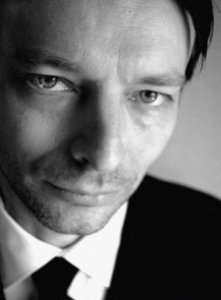What first attracted you to horror writing?
I can’t really remember a time when I didn’t write some kind of story, and there was always horror involved – but a key moment was having the Beowulf and Grendel story read out in class at primary school. There was more blood and guts in school back then – in a good way… Beowulf stuck with me (it was the wrenched off arm that did it) to the extent that my first novel was a monster story set in ancient Scandinavia with a hero named Bjolf (the Old Norse version of the name Beowulf). Although not horror, reading H G Wells as a kid also made a huge impact. There’s a deep and dreadful horror in many of his works, especially War of the Worlds and The Time Machine. Beyond that, reading 2000AD comic, and watching old Universal horror double bills late at night when my parents thought I was asleep.
 What is your most notable work?
What is your most notable work?
My debut novel, The Viking Dead, which brings zombies and vikings together at last. Prior to this, most of my published stuff was journalistic, including a Halloween werewolf hoax for which I also made the wolf costume. The other big thing for me was a piece about the origins of Shelley’s poem Ozymandias, which won the Keats-Shelley Memorial Prize. I spent the prize money on a Fender Telecaster.
What are you working on now?
A script – which is the other thing I do – not horror at all, but kind of a contemporary Western with a massive heist in the first ten minutes. There are also a couple of other zombie novels being worked out, one set in Victorian London and the other a contemporary piece that I can’t yet talk about, but which is even more bonkers than The Viking Dead. Also some other script ideas, one of which goes back to Beowulf.
Who do you admire in the horror world?
Mainly filmmakers – that’s where my big influences are. It’s a long list, but at the moment Frank Darabont is somewhere near the top, partly because of The Walking Dead, but mainly because of The Mist, which I thought was amazing. It showed he understood true horror, and that it does not always emanate from ‘monsters’… And you cannot ignore Stephen King. What I admire about him (amongst other things) is his pragmatism. I was reading Salem’s Lot recently and there are these amazing passages of rich, evocative description when a scene needs to be set. Then, when things just need to move forward, the writing is straightforward, matter-of-fact – no frills. He doesn’t waste anything, just knows exactly what’s needed. I learned a lot from that. There are three others I should mention: Lovecraft, who makes the entire cosmos monstrous; H G Wells, who probably influenced me more than any other storyteller; and Mary Shelley, whose influence on all of us is so great it cannot be calculated.
Do you prefer all out gore or psychological chills?
I like a bit of gore, but without that psychological backdrop it’s pretty meaningless. Also, I think the attitude the work itself takes to the gore is important. For me one of the benchmarks is The Texas Chain Saw Massacre (even though there’s comparatively little gore actually shown). Tobe Hooper seems to be saying ‘My God, look how truly awful this is…’ It’s like he doesn’t really want to look either, but is doing so to ensure that this horror has been witnessed, that its warning has been read. We all enjoy horror, of course, but we should fear it too – respect it, in a way. I have a deep dislike of supposedly serious works that approach it with too obvious relish. It’s adolescent – the attitude of someone who has never encountered anything really bad.
Why should people read your work?
Because they like it – there’s no other reason to. With The Viking Dead, what I hope they will like is the sense of creeping horror (of course) but also the world that is created, into which this horror intrudes. I wanted to evoke a 10th century viking world as realistically as possible before, er… doing bad stuff to it. I was also very aware that zombies can seem rather more repetitive on the page than they do on the screen – ‘Here’s another one… oh, and here’s another one…’ – so I set out with the intention of twisting the genre a bit here and there, so what was encountered wasn’t quite what was expected. And I kind of wanted to find out how deep that nightmare could go.
Recommend a book.
OK, I’m going to be radical and go for something non-fiction. Sort of… On Monsters: An Unnatural History Of Our Worst Fears by Stephen T Asma is a great book about monsters and monstrosity of all kinds, ancient and modern.





